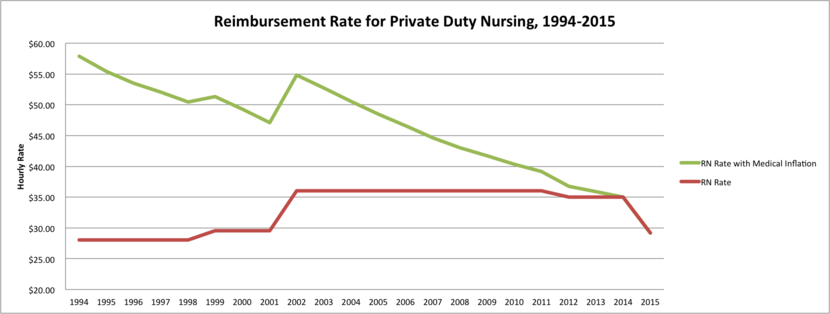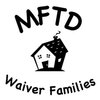Fighting Reimbursement Cuts
As of May 1, home nursing provided by the MFTD Waiver received a 16.75% reimbursement cut. This devastatingly large cut is keeping kids from being able to leave the hospital and putting kids back into the hospital. Worst of all, it is not saving money. If only 8 kids are hospitalized, all the savings from the reimbursement cut disappear.
We are fighting vigorously against these cuts. Please use the following information to help fight these cuts.
- One-Page Fact Sheet Updated 7/30/15
- Fact Sheet on Reimbursement Cuts
- Contact Your Legislator
- Sample Letter to Send to Legislators or the Governor
- Open Letter to Gov. Rauner on Reimbursement Cuts to the MFTD Waiver
- Advocacy Page for Complex Rehab Technology (wheelchair, hospital bed, etc.)
- Statement from Chicago-area DME Providers (ventilators, oxygen, enteral nutrition, etc.)
Please visit our In the Media page to view coverage of this issue in the media.
Reimbursement Cut Fact Sheet
Overview
- As of May 1, 2015, Illinois has made a 16.75% across-the-board cut to Medicaid reimbursement rates.
- This cut is for the months of May and June only.
- A new budget will be in place as of July, but we do not know if these cuts will be continued, modified, increased, or eliminated at this time.
Services Affected
- RN, LPN, and CNA services will be cut by 16.75%
- All other home health services will be cut by 16.75%
- DME and supply reimbursement will be cut by 16.75%
- Therapy services reimbursement will be cut by 16.75%
- Physician reimbursement for pediatric subspecialists will be cut by 16.75%
- The following services are EXEMPT from the 16.75% cut:
- General pediatric care (due to Memisovski consent decree)
- Hospital care
- Mental health services
New Fee Schedules
- An updated fee schedule is available at http://www2.illinois.gov/hfs/SiteCollectionDocuments/2015_hhfeeschedule.pdf
- Rates are as follows:
- RN (Cook, DuPage, Kane, Will): $29.16
- LPN (Cook, DuPage, Kane, Will): $25.92
- RN (other counties): $23.93
- LPN (other counties): $20.63
- CNA: $16.65
Fiscal Irresponsibility
- Based on 2012 data (the most recent complete data available), the state would only save about $853,001 in May and June by reducing the reimbursement rate on MFTD Waiver children. (Note that NPCS children were not included in this analysis.)
- If just EIGHT (8) MFTD Waiver children are hospitalized for the two months of this reimbursement cut, all savings will be lost.
- It costs six times as much to hospitalize a child than it does to provide private duty nursing care for the child at home.
Facts on the Reimbursement Cut
- Even before the most recent reimbursement cut, families struggled to find nurses, in large part due to low reimbursement rates. A survey of families in January 2015 found that only 70% of approved and requested nursing care hours were staffed.
- According to the fee schedule, Private Duty Nursing is the only home health service that was cut both in 2012 (due to the SMART Act) and in 2015.
- These two cuts combined represent a 19% total reimbursement cut since 2012.
- Reimbursement rates have not been increased in 13 years, since 2002.
- Adjusting for medical inflation, reimbursement rates have been cut by 50% over the past 20 years.
- The following graph (below) represents the changes in reimbursement rates for urban RN cases over the past 20 years, based on information provided through a Freedom of Information Act request from HFS. The bottom line is the change in actual dollars. The top line is the change adjusted for medical inflation, using the Medical-Cost Inflation data set, which is part of the Consumer Price Index, using 2014 dollars.
The HUMAN Cost
- We anticipate that several nursing agencies will drop all of their Medicaid clients. These children are unlikely to find another agency willing to take them, and may end up in the hospital at six times the cost to Medicaid.
- We anticipate that most agencies will no longer accept Medicaid clients, meaning children waiting for home care will stay longer in the hospital.
- We anticipate that nurses in most agencies will receive a pay cut, at least temporarily, and that many will quit. This will again lead to children being hospitalized since nurses cannot be found to care for them at home.
- The two largest mobility suppliers, NuMotion and National Seating and Mobility, will no longer provide equipment and repairs during May and June.
Potential Legal Issues
- Illinois has an obligation under the Early Periodic Screening, Diagnostic and Treatment (EPSDT) provision of federal law [42 USC §1396d(r)] to provide private duty nursing to children who require it. They are also required to arrange for this care and ensure it is being provided [42 USC §1396a(a)(43)(C)]. Any change in policy or procedure that makes children unable to access private duty nursing may violate these laws.
- Illinois also must ensure that children have the right to live in community settings under the Olmstead decision, which clarified the Americans with Disabilities Act (ADA). Any change in policy or procedure that forces institutionalization or hospitalization on children may violate the ADA.
Future Steps
- MFTD Waiver Families will begin organizing a media and legislative strategy over the next few weeks.
- MFTD Waiver Families may initiate legal action if children are unable to access private duty nursing services or are subject to forced hospitalization.
Goals
- Short-term: An immediate exemption from the 16.75% reimbursement cut for pediatric private duty nursing, due to the medical vulnerability of this population.
- Long-term: Ensuring that reimbursement cuts to private duty nursing and other Medicaid services that affect children with complex medical issues are not included in the 2016 budget.
Download the Fact Sheet on Reimbursement Cuts

|
Year |
RN rate |
RN rate adjusted for medical inflation |
LPN rate |
LPN rate adjusted for medical inflation |
|
1994 |
$28.05 |
$57.87 |
$23.97 |
$49.45 |
|
1995 |
$28.05 |
$55.38 |
$23.97 |
$47.32 |
|
1996 |
$28.05 |
$53.50 |
$23.97 |
$45.72 |
|
1997 |
$28.05 |
$52.05 |
$23.97 |
$44.48 |
|
1998 |
$28.05 |
$50.43 |
$23.97 |
$43.10 |
|
1999 |
$29.55 |
$51.33 |
$25.47 |
$44.24 |
|
2000 |
$29.55 |
$49.31 |
$25.47 |
$42.50 |
|
2001 |
$29.55 |
$47.14 |
$25.47 |
$40.63 |
|
2002 |
$36.00 |
$54.86 |
$32.00 |
$48.76 |
|
2003 |
$36.00 |
$52.75 |
$32.00 |
$46.88 |
|
2004 |
$36.00 |
$50.52 |
$32.00 |
$44.91 |
|
2005 |
$36.00 |
$48.49 |
$32.00 |
$43.10 |
|
2006 |
$36.00 |
$46.62 |
$32.00 |
$41.44 |
|
2007 |
$36.00 |
$44.66 |
$32.00 |
$39.69 |
|
2008 |
$36.00 |
$43.06 |
$32.00 |
$38.28 |
|
2009 |
$36.00 |
$41.73 |
$32.00 |
$37.09 |
|
2010 |
$36.00 |
$40.35 |
$32.00 |
$35.87 |
|
2011 |
$36.00 |
$39.18 |
$32.00 |
$34.82 |
|
2012 |
$35.03 |
$36.76 |
$31.14 |
$32.68 |
|
2013 |
$35.03 |
$35.87 |
$31.14 |
$31.88 |
|
2014 |
$35.03 |
$35.03 |
$31.14 |
$31.14 |
|
2015 |
$29.16 |
$29.16 |
$25.92 |
$25.92 |
This number was calculated using 2012 data, and a Medicaid inpatient cost of $56,000 per month, per child.
We calculated this fact by comparing the yearly cost of inpatient hospitalization to Medicaid ($56,000 * 12 months = $672,000) to the average annual cost of private duty nursing in 2012, which was $106,650.
